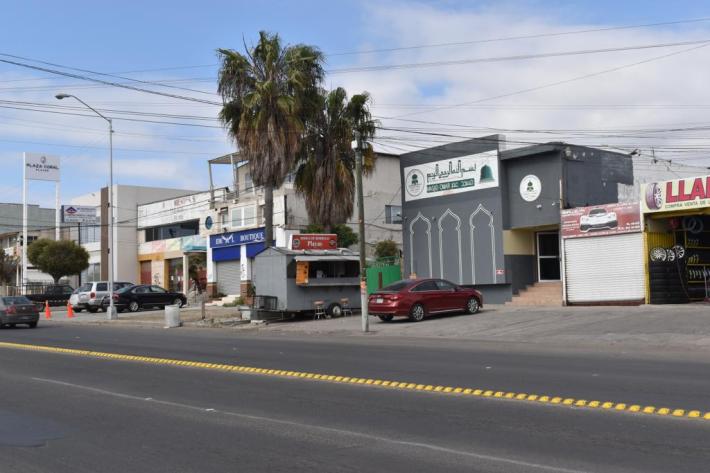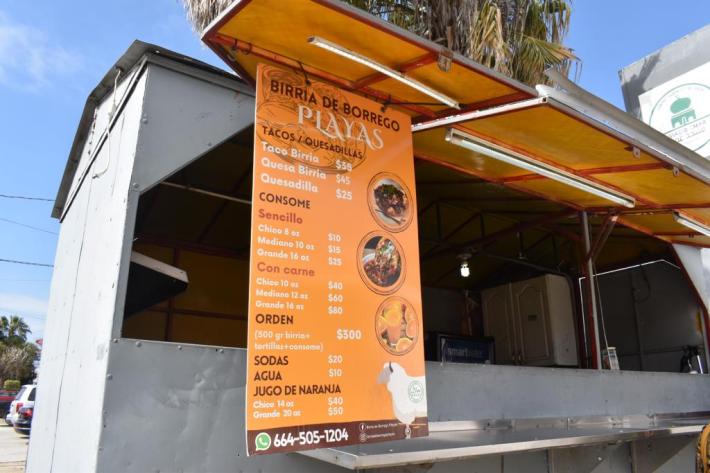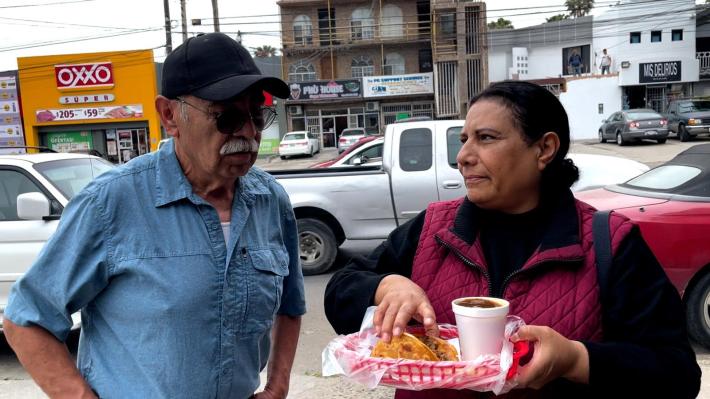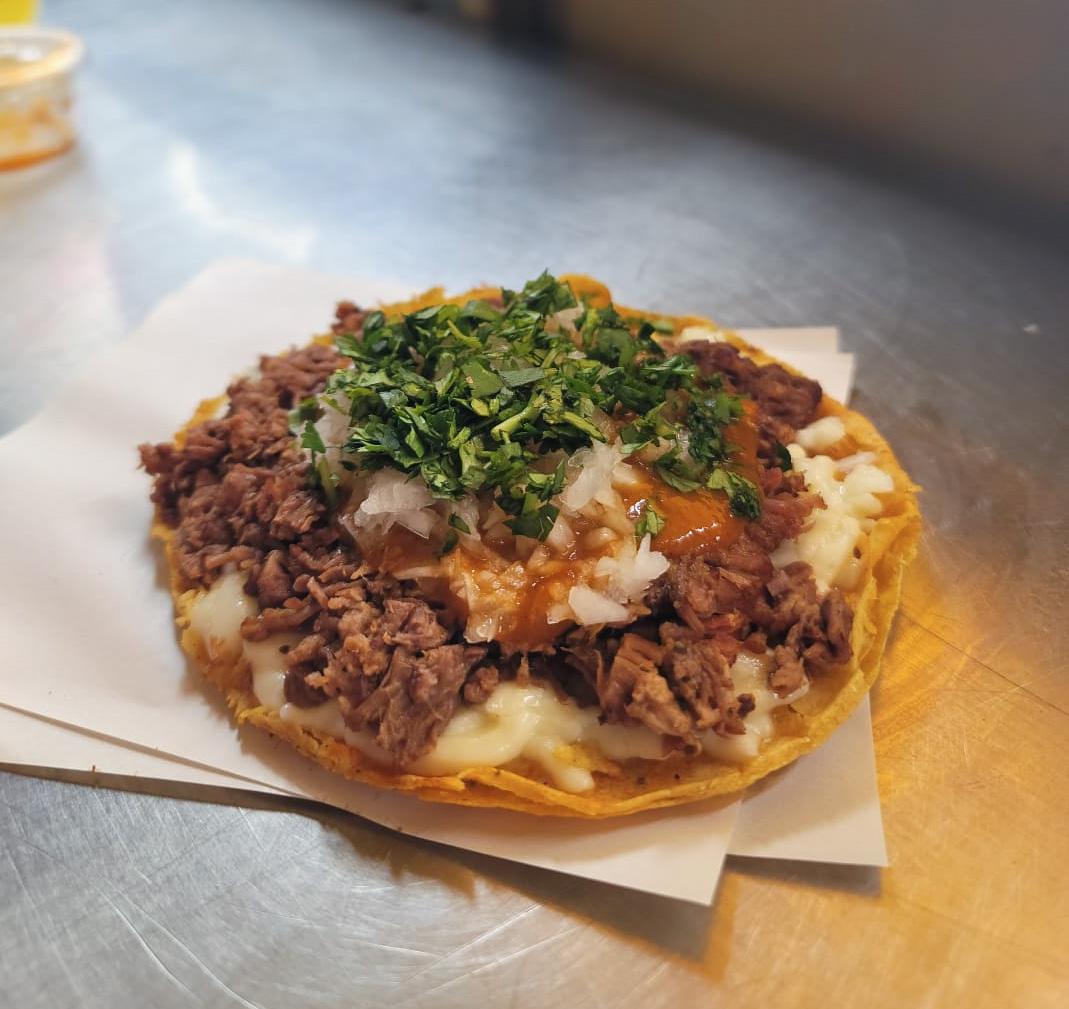A few blocks from the beachfront row of Jalisco-inspired birria vendors, Egyptian aromatics cut through the traditionally spiced, ancho, and guajillo chile-scented ocean mist of Playas de Tijuana, where Mohammed Gamal sets up shop in front of the Centro Islamico de Baja y Masjid Omar. It’s Tijuana’s most prominent Islamic cultural center and mosque—serving Arabic migrants, Muslim mosque-goers, and longtime residents of the Tijuana borough.
Gamal’s most popular staple on his menu is also the namesake of the slightly worn, modest-but-mighty stationary food truck he rents and operates out of Birria de Borrego—an Arabic and halal take on the more traditional goat or beef-centered birria taco originating from the southern state of Jalisco.
“Each state here in Mexico has a different style of birria. When some people from Mexico come and eat from me, they ask me which style my [birria] is from, which city it’s from,” Gamal says. “I can’t tell them it’s Egyptian style–I just tell them it's Tijuana style.”


Upon first sight and smell, Gamal’s birria de borrego epitomizes Tijuana’s border culture. Served on checkered wrapping paper and cherry-colored plastic trays reminiscent of SoCal’s In-N-Out fast food culture, the birria de borrego cradles a delicate, Egyptian-Mexican spiced shredded lamb, which Gamal then drenches with a rich golden broth flavored with both a secret Egyptian spice blend and a traditional combination of ancho, guajillo and arbol chiles from Mexico. He finishes off the taco with layers of mozzarella cheese, salsas, cilantro, and lime.
“Most of the people here from the mosque, when they tried Mexican food from me, they loved it–and they didn’t expect that,” Gamal says. “They’ve never eaten Mexican food before because it’s not halal. They’ve never tried tacos or know how good it is to eat tacos. Now they have the chance to join the Mexican people who come here too.”
“We have another [type of] birria our way—we do a yellow [kind of] birria in Egypt,” 32-year-old Gamal says, gesturing to a simmering pot of golden broth he uses as the base for his birria. When he adds the Mexican chiles and the broth darkens to a deeper red, his birria then becomes Mexican, he says.
“Many people here do their food from Arabic countries, but I wanted to see if I could do food from Mexican culture, too,” Gamal says. “It’s a good challenge for me, and I find that I can add my own Egyptian touch to it so that I like it and [Mexican] people like it too.”
For Gamal, birria de borrego carries with it an unshakeable longing for home. The “secret touch” to his birria, he says, is simply an adapted melange of his mother’s home recipes from back in Egypt. Now married to his born-and-raised Mexican spouse, who Gamal says inspired the Tijuana-style taco, birria de borrego also carries with it an ambition to reinvent home at the border of his Arabic and Tijuanian identities.
“My wife loved it so much, and I just started wondering what birria was,” Gamal says. “At that time, I didn't speak Spanish, and I never tried birria outside, because the food is not halal here.”
Gamal says most of the birria vendors in Playas de Tijuana use beef in their tacos, sourced from cows killed with guns rather than slaughtered using halal guidelines for humane sacrifice. After finding a halal butcher to source his meat from, Gamal floated the idea of preparing a birria taco with lamb instead.
“And people told me, ‘Of course, it’s going to be so delicious,’” he says.
Gamal first set up in front of the Centro Islamico for easier access to a mosque, where he joins Imam Abdul Rahman in prayer five times a day. Since then, birria de borrego has become a cultural bridge between Tijuana’s Muslim community and the general Mexican population—two worlds in close proximity due to the border town’s growing Muslim refugee population that have often felt elusive to one another.

About 78% of the national Mexican population identifies as Catholic, while only about 0.2% identify with other religions, including Islam, according to the 2020 Mexican government census. Since the opening of Zona Norte last year, a two-story shelter situated six miles from the U.S.-Mexico border housing about 150 Muslim refugees from countries like Kenya, Ghana, Russia, and Afghanistan, Tijuana’s Muslim population has felt the growing pains of assimilation in a town that knows little of Islam’s religious and cultural practices, especially when it comes to halal food preparation. One of Gamal’s unique selling points, he says, is that his birria meets the rising demand for halal Mexican food.
“Most of the people here from the mosque, when they tried Mexican food from me, they loved it–and they didn’t expect that,” Gamal says. “They’ve never eaten Mexican food before because it’s not halal. They’ve never tried tacos or know how good it is to eat tacos. Now they have the chance to join the Mexican people who come here too.”
Gamal recounts meeting two actors from Hollywood who came down to birria de borrego to try halal Mexican food for the first time, ending up making the trip down several times again thereafter.
“I get many customers from L.A. who cross the border and are looking for halal food. And once they find Mexican halal food, it becomes very familiar [to them],” Gamal says. “Arabic food is everywhere, but Mexican halal food, that is rare.” Around Los Angeles, there is only one local taquería that offers halal meat for tacos: Fatima's Grill. They are a local franchise that has four locations around the County, including one in downtown Los Angeles, Downey, Long Beach, and Paramount.
For Rahman, longtime Tijuana residents’ endorsement of birria de borrego speaks volumes to Gamal’s reverence for authenticity. Only a year into the business, Gamal effortlessly brushes off any speculation that his birria might be a confused mutant of two distant palettes.


“Mohammed's food is actually Mexican, that, as some say, is better than [traditional] Mexican birria. He is doing it with love and sincerity. That's why it works out well,” Rahman says. “I really enjoy his food, and so do Mexicans.”
For non-Muslim residents of Playas de Tijuana, Gamal’s specialty in lamb birria exemplifies the serendipitous inventions that can emerge from Tijuana’s global and accessible street food culture. Jesus Gonzalez, a retired electrician and resident of Playas de Tijuana, discovered Gamal’s birria six months ago while on the lookout for Mexican lamb dishes.
“In my town, we only had goat birria,” Gonzalez says. “And here in Tijuana, they hardly sell lamb. There are almost no places. They only sell lamb barbacoa, for the most part.”
“This is one of the things that makes me happy [about Tijuana],” Gamal says. “[People] are willing to try anything. I just tried [something], and they loved it.”
Mohammed Gamal
Often revered as the more tender, flavorful, and pricier counterpart to goat or beef, lamb can be a rare but not entirely foreign find in Mexican street food, say Agostini Salómo and Beatriz Ángel, a retired couple from San Diego. Salómo and Ángel moved to Tijuana partly for the versatile street food they felt lacking in the States, pointing to Gamal’s Egyptian-inspired menu as a paradigm for multicultural cuisine.
“Here at the border, it's common to see people of different nationalities,” Ángel says. “Nothing is that unique because everyone is from different places. Here you will find lots of variety.”
But the couple’s exposure to Tijuana’s Arabic community, Salómo says, felt limited before spotting the lamb birria stand while on a drive across the coast. After watching TV shows about food preparation practices used in Turkey and Egypt, Salómo says they felt compelled to try Gamal’s Arabic-inspired menu.
“This is one of the things that makes me happy [about Tijuana],” Gamal says. “[People] are willing to try anything. I just tried [something], and they loved it.”
Gamal’s birria stand, however, is not simply a tool to assimilate into the mainstream Mexican culture; it is also an invitation extended to the larger community to experience the city’s Arabic cultural scene and the immigrant community at the heart of it. Rahman says birria de borrego is often where the Catholic majority gets to know Tijuana’s small Muslim community up close.
“[Birria de Borrego] lets them come and learn about Muslims, hear from Muslims themselves, instead of hearing misinformation about Muslims,” Rahman says.
Having earned the Mexican public’s trust with his birria tacos, Gamal hopes to eventually open up a restaurant serving Egyptian food from back home. He’s on the lookout for a potential business partner to upgrade out of the food truck, but he wants to stay close to the mosque and the community he’s helped carve out of the front parking lot.
“I want to introduce to you my culture, my food, and my mother,” he says, adding that he also hopes to fly his mother out from Egypt and have her experience his new taste of home someday.
While he prepares to close shop before his fifth and final prayer of the day, Gamal is approached by Guanto Giwinyisilagun, an illustrator living in Tijuana since the beginning of the pandemic who often visits Gamal’s truck to order the birria broth alone.
“I'm from Taiwan, where one of the popular cultural dishes is a noodle soup. It's basically birria, but with noodles,” Giwinyisilagun says. “The soup alone is just so flavorful. There's something familiar about this area and the [soup] here that reminds me of my home across the ocean.”
Catching the tail end of Giwinyisilagun’s sentence, Gamal thanks him for his kind words, adding that being reminded of home has always been his mission behind birria de borrego.
P.º Ensenada 1552, Playas, Triangulode Oro, 22504 Tijuana, B.C., Mexico
Open 8:30 AM to 8:30 PM.
This story is part of TIJUANA WEEK at L.A. TACO! A collaboration with Professors Amara Aguilar, Laura Castañeda, and USC Annenberg School for Communication and Journalism. Make sure to check back daily for more stories.







